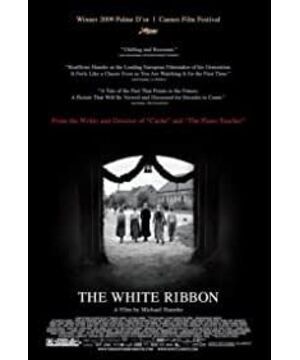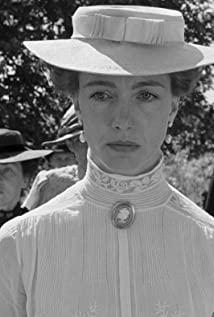SDMS Score: 92
Before watching "White Ribbon", some friends always compared this movie to "Dog Town". It is true that the two films have some similarities, such as the stories taking place in a village, exploring the violent side of human nature, and simplifying the narrative as much as possible ("Dogtown" is a By simplifying the scene, White Ribbon simply forgoes any soundtrack).
However, the similarities between the two films end there, and Lars von Trier logically deduces by creating an extremely ideal closed environment: how does the evil flower in human nature It is a very subjective artistic conjecture to bloom freely in the potential difference of status rank. Michael Haneke, on the other hand, stayed as neutral as possible and told the whole story through the mouth of a character who didn't have a full understanding of the events themselves. There is no difference between the two in terms of technique, but the personal preferences of the audience may be different.
The "white ribbon" is a very appropriate "simile", and it is tied on the body as a reminder: to make what you do as pure as white silk. From the special status of the priest, it can be understood in this way: the white ribbon can be said to be the belief foundation and moral code of the village and even the whole of Germany. There is no visual standard for good and evil, or even a boundary that can be used to talk about. The white ribbon becomes the criterion for judgment in everyone's heart.
In the movie, there are actually no outright villains, especially among the elders. The baron showed sufficient reason, self-control and control; the priest had keen insight and a high sense of discipline; even a farmer worked diligently and was grateful to his employer, even if his wife died mysteriously. I don't want to express my doubts too much. This village character, which is as accurate and depressing as a clock, distorts the hearts of children step by step.
The farmer's son destroys an entire field of fruit in revenge on the baron, the priest's daughter rubs scissors into the bird's chest to mock her father's alleged upbringing, the village chief's son pushes another child into the water with a whistle, Martin The suspicion of one's own sin even needs to do some high-risk actions to prove that his survival is still forgiven by God... Although the
movie does not give any answers to the suspense, everyone will believe that the child is the culprit. (The film also stated that "this is a movie about children" at the beginning.) And what makes all this is the sanctimonious way of life for adults, the class system that is absurd, and the harsh education method. In the group of children led by the pastor's daughter, who have evil skills including violence, eavesdropping, lying, etc., these children will become the backbone of Germany in World War II decades later. This way of deconstruction has made the existence of the Nazis a form of nature. In fact, the shadow of the Gestapo can already be seen in the priest's daughter.
Two very interesting characters, one is a doctor and the other is a midwife. The doctor represents a kind of saving the dying and helping the wounded, eliminating evil and promoting good, and it is the eradicator of all human stubborn diseases. The midwife is, in a sense, the creator of the future of a country and society. But the doctor and the midwife also condensed the purest sins in the whole movie - the doctor was lustful when his wife was alive, got into a mess with the midwife, and molested his daughter; and the midwife just let it go , just to enjoy the pleasures of the flesh and maintain the satisfaction of being a "woman who is a doctor".
The depravity of doctors and midwives is the depravity of society as a whole. At the end of the film, after the doctor and the midwife disappeared from the village one after another, rumors spread that they were all at fault. Although this is a rumor, it is actually a statement of the director himself. Stubbornness and unkindness of teaching children are the root of all evil in the village. And that timely war buried all internal suspicions and contradictions, and gradually transformed into a kind of inexplicable hatred of unanimous external.
View more about The White Ribbon reviews











